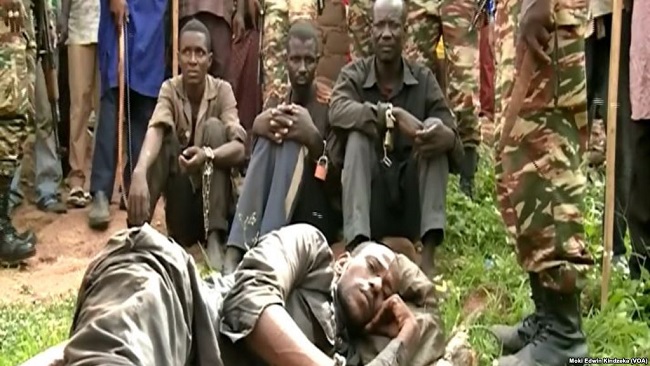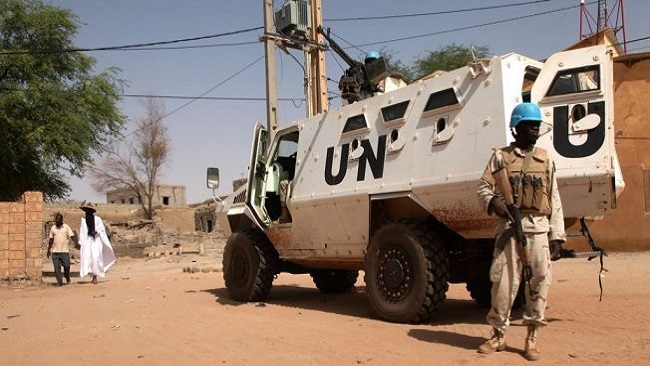2, February 2021
Central African Republic faces dire humanitarian plight 0
Violence-torn Central African Republic is facing an increasingly dire humanitarian situation with high insecurity on the main supply route from Cameroon blocking humanitarian deliveries and prices for basic food prices soaring, the United Nations said Monday.
U.N. spokesman Stephane Dujarric said this is happening as 2.3 million people are already projected to need food, while rapid assessments are showing “alarming figures of severe malnutrition among the newly displaced.”
The U.N. reported Friday that 200,000 people have fled their homes in the impoverished country in less than two months and are displaced inside and outside the country.
According to local authorities, 92,000 refugees have reached Congo from Central African Republic and over 13,200 have crossed into Cameroon, Chad and the Republic of Congo, with more continuing to arrive, Dujarric said.
Central African Republic’s former president, Francois Bozize, and his allies have been accused of inciting the latest violence, which erupted after the constitutional court rejected his candidacy to run for president in December.
President Faustin Archange Touadera won re-election in December to a second term with 53% of the vote, but he continues to face opposition from forces linked to Bozize.
On Jan. 13, rebels attacked the outskirts of Bangui, killing at least two U.N. peacekeepers and blocking important access roads to the capital, causing food prices to skyrocket. The rebel attack was the most serious threat to Bangui since 2013, when a coalition of predominantly Muslim rebels known as Seleka overthrew Bozize’s government.
The Seleka formed a new government that they said would redress the years of marginalization of the country’s Muslim population. Later that year, that government was challenged by militia fighters known as the anti-Balaka who attacked Bangui. The anti-Balaka began attacking Muslim civilians, beating people to death in the streets, destroying mosques and forcing tens of thousands of Muslims to flee Bangui in 2014.
The Seleka rebel president eventually stepped aside amid international pressure and an interim government organized democratic elections in 2016, which Touadera won.
Dujarric said a key cause of the current deteriorating humanitarian situation is the very high level of insecurity along the road link to Cameroon where over 1,600 trucks, including 500 with humanitarian supplies, have been blocked at the border since mid-December, causing a suspension of imports.
“Humanitarian organizations are beginning to report critical stock outages including food and trauma kits,” he said. “The closure of the supply route also caused a worrying increase in the prices of basic foodstuffs — that’s cassava, oil, meat and rice,” of between 75% and 220%.
“This is impacting several markets in the country, including that of the capital, Bangui, and we’re also seeing the closure of several markets because of the impossibility for traders to restock,” Dujarric said.
The United Nations is appealing for $444.7 million to assist 1.84 million people in Central African Republic in 2021, he said.
U.N. refugee spokesman Boris Cheshirkov warned Friday that tens of thousands of refugees from the country are facing dire conditions.
In Congo, he said, new arrivals who crossed the Ubangi, Mbomou and Uele border rivers told refugee officials they fled in panic when they heard gunshots, leaving their belongings behind.
Most refugees are living in dire conditions in remote, hard-to-reach areas close to the rivers without basic shelter and facing acute food shortages, Cheshirkov said. They are dependent on catching fish and on what local villagers with extremely limited resources can spare.
For many, he said, the rivers are also the sole water source for drinking, washing, and cooking, and malaria, respiratory tract infections, and diarrhea have become common.
The U.N. refugee agency is urgently appealing for food, shelter, drinking water, sanitation and health care to help those who fled Central African Republic and prevent the spread of COVID-19 and other diseases, Cheshirkov said.
Source: AP

























10, February 2021
Mali: 20 UN peacekeepers wounded 0
Around 20 United Nations peacekeepers were wounded in an attack on their base in central Mali on Wednesday, a UN spokesperson said, offering a provisional toll.
Unidentified militants attacked a temporary base near Kerena, a village in the war-torn centre of the Sahel state, at around 7 am.
Olivier Salgado, the spokesman for the UN’s MINUSMA mission in Mali, said the position was “targeted by direct and indirect fire.”
First established in 2013, the 13,000-strong MINUSMA has suffered one of the highest death tolls of any mission in UN peacekeeping history.
Over 230 of its personnel have died since the mission began, and improvised explosive devices killed five peacekeepers last month alone.
The latest casualties were from a Togolese contingent of peacekeepers, according to an official briefed on the matter, who requested anonymity.
Some peacekeepers were gravely wounded, the official added.
A municipal government official, who declined to be named, also told AFP that militants drove an explosives-laden vehicle into the camp before opening fire.
Mali has been struggling to contain a jihadist insurgency which first emerged in the north of the country 2012, and has since spread to the centre of the country and to neighbouring Burkina Faso and Niger.
Thousands of soldiers and civilians have been killed and hundreds of thousands more have had to flee their homes.
Four peacekeepers were killed by a roadside bomb in northern Mali on January 14, and one died the following day in a similar blast.
– Cycle of violence –
Central Mali is an epicentre of the Sahel conflict where assaults on soldiers and ethnic killings are common.
Ten Malian troops were killed in the same area last week when al-Qaeda-affiliated jihadists raided their camp.
The attack on the UN base comes ahead of several important political summits dedicated to curbing the Sahel conflict.
France and the G5 Sahel — a military alliance comprising Burkina Faso, Chad, Mauritania, Niger and Mali — are due to meet in Chad on February 15 and 16.
Signatories of the shaky Algiers peace accord are also due to meet in the northern Malian town of Kidal on Thursday.
Mali’s government and several armed groups signed that agreement in 2015. Among other things, it provides for decentralising governance in the vast and ethnically-diverse nation of 19 million people.
Although the implementation of the Algiers accord has been extremely slow, the deal is viewed as one of the few escape routes from Mali’s cycle of violence.
Source: AFP